
Biology
202
Neurobiology and Behavior
Spring 2007


| Biology
202 | 
|
The challenge in general
Review of Blink, NY Times Book Review, 16 January, 2005
The response in general
| Biology major? | 20 |
| Psychology major? | 7 |
| NBS concentrator? | 12 |
| Other majors | sociology (4), philosophy (3), anthropology (3), chemistry (3), political science (3), english (2), postbacc (2), geology, fine arts, romance languages |
| Satisfy science requirement | 6 |
| Interested in biology/nervous system? | 9 |
| Interested in psychology/behavior? | 18 |
| Interested in philosophy/nature of reality/human experience? | 14 |
| Interested in practical problems? medicine, psychiatry, education social activism, etc? | |
| Want to understand who you are? why you/other people behave the way you/they do? What you/they can do about it? | lots |
Neurobiology and BEHAVIOR ... what is "behavior"?
| actions of individuals and groups, reactions to stimuli, effects of thinking on action, chemicals/hormones, emotion, thought, mimicking, prediction, ethics/morals, rationality, social/cultural values, creativity, self-determination |
NEUROBIOLOGY and behavior ... Neurobiology = study of the nervous system ... what is the "nervous system"?
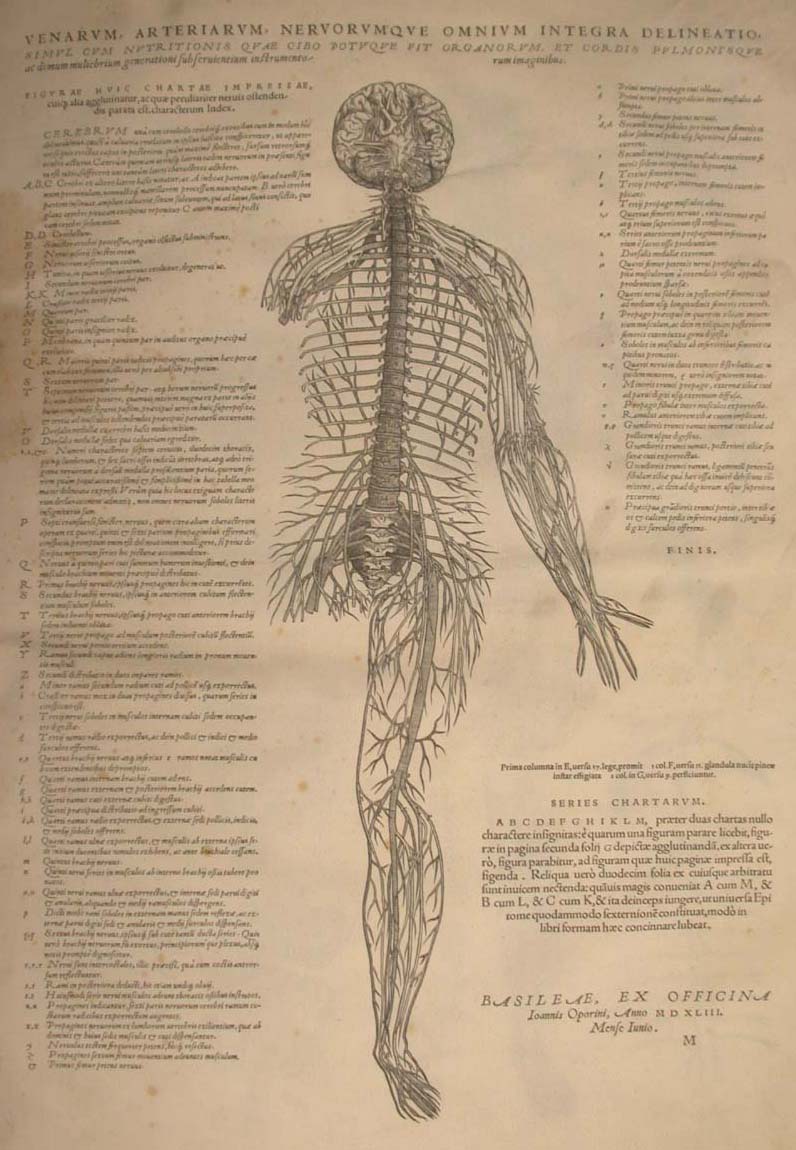
| Image by Andreas Vesalius (1514-1564), contemporary of Copernicus, suggested (less than 500 years ago) that nervous system rather than heart was origin of behavior (see Milestones in Neuroscience Research for a time line extending from 4,000 B.C.). | 
| Image by Rene Descartes (1596-1650). Set framework for several centuries (and continuing) discussion: mind and body distinct things or same thing? |
| Nervous system is material object, part of body, can be touched, manipulated, measured. What IS the relationship between brain (nervous system) and behavior (broadly defined to include human experience)? Subset of this are questions such as the relation between mind and brain, mind and body, matter and spirit, matter and form ... | |||
Brain = behavior?, from a "scientific" approach:
| Linear science | Seriously loopy science |
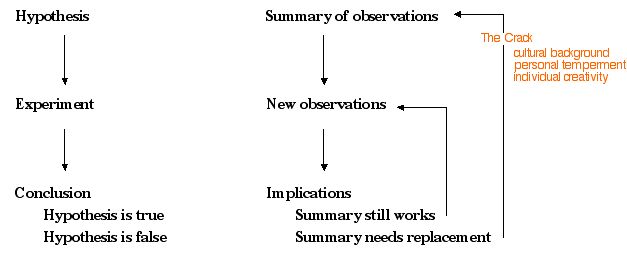 | |
| Science as body of facts established by specialized fact-generating people and process
Science as successive approximations to Truth
| Science as ongoing process of getting it less wrong, potentially usable by and contributed to by everyone
Science as ongoing making of observations, intepreting/summarizing, making new observations, making new summaries Science as process of inquiry into anything, one which everybody is equiped to do/can get better at/be further empowered by, and contribute to - a way of making sense of what is but even more of exploring what might yet be |
| If science is as much about creation as discovery then the "crack"is a feature, not a bug ... and differences among people are an asset to the process rather than a problem or an indication it isn't working |
Trying It Out
Scientific stories are frequently efforts to summarize the widest possible range of observations, always motivate new observations and hence new stories, should never be understood as "authoritative" or "believed in", do not compete with or invalidate other stories.
Key issues about scientific stories
|
Which story do you prefer about brain and behavior?
| Descartes et al: There is brain and mind (or soul or ...) | 19 |
| Dickinson et al: Its all brain/neurons/matter ... | 14 |
| Unsure/fence-sitting/other | 12 |
Issue is not "Truth" but whether there is a good "summary of observations", "working hypothesis", something that contributes to getting it continually "less wrong" is useful for the ongoing generation of new stories in science and in culture at large ... Keep "loopiness" in mind, not only for science but also for the brain
Start with overview of the "trend of the evidence":
Our task for the semester (and beyond?):
Let's roll ... Forum area this weekend: YOUR thoughts on "brain=behavior", on science, on ... ?
Starting with what one thinks .... and getting used to/seeing the advantages of being wrong
|
By treating stuttering as a legitimate disease, it is possible to pinpoint the source, which scientists are currently in the midst of doing, and find a drug that will be able to minimize the amount and severity of stuttering that some people suffer from. This could not only improve their speaking skills, but also their general quality of life ... Cayla Something to think about is that if Descartes was alive right now amidst these technologies and discoveries would he still believe in his mind and body theory? ... I am a believer of brain= behavior but recognize Descartes for his importance in laying the foundations for thought in this field.Aditya The brain may be responsible for the chemical actions that physically cause behavior, but I think it is very short sighted to think that the brain causes all behavior. Environmental factors, upbringing, role models, culture and situation all influence behavior. The brain cannot stand alone as the reason for all behavior ... Ariannah I think every environmental and social influence, has to be taken in through the brain ... Karen I feel behavior has a spiritual side because there are some aspects of human nature that seem unexplainable. My best example is human innovation ... What in the brain formulates new technology that drives our world forward? ... Perhaps, there is an intangible factor to behavior that science cannot justify. In my opinion, Descartes theory of dualism between the brain and the soul seem to explain the unexplainable ... Lauren Whether all of these behaviors most definitely not associated with the nervous system are due to a soul or mind or something else that is present in all creation I really don't know and would not hazard to guess at ... Alexandra even though the brain may control a great deal of our physical body, there is something else that we remain ignorant of ... Mollytam I have come to believe in the Buddhist canon that there is no self, just the mind and body. I think that is the beauty of seeing the mind separate from the brain. It helps one understand that all things barely last a moment in time, and the mind has the ability to interpret the information in a better way ... A. Kyan I just find it impossible to believe that there isn't something else... perhaps an energy, or something ... Antonia
To extend Holly and Stacey's lines of questioning, what are we to make of moral/ethical behavior in the context of brain vs. spirit? If morality is inextricably linked to spiritual constructs of right and wrong in Western thought, does this mean you cannot behave morally without a belief in a "higher power?" ... secalwe figuring out which gender you identify with may be a lifelong process, and may even change during the course of your life ... steph
the idea that you, and I, and everything I can see right now is somehow only present because I perceive it is a crock. I think these things exist, with or without me, in my reality and in yours. But, I believe my presence allows me to perceive it my way. It just reminded me so strongly of that old conundrum: If a tree falls in the forest ... dmckeever I'm inclined to disagree, if only to be the devil's advocate. The trend is that when trees fall in forests, they make noise, but that's only because we are there to perceive the sound. Something only happens if it is observed ... Sarah
this raises a handful of somewhat frightful questions: are we nothing more than a collection of attributes? And if so, do we have any say in the matter? Or are we hardwired from birth with certain associations and configurations? Nevertheless, even if we were nothing more than a bundle of properties, with no distinction between mind and body nor physical and non-physical, we would still be in a constant state of flux and change ... And that's what human beings seem to be; we are works in progress, more or less ... Meera if one makes an active effort to change a behavior and suceeds in doing so then does that also cause a change in the brain? This question I think makes more sense if you think of the brain and mind as seperate things because it's hard to think of an actual change in the brain on a material level as if rewiring the calculator. Or is it that people can't actually change their behavior and we have no control over it ... plebron87 You can't change your genes, but you have the ability to act against your natural tendencies from them, which is an interesting idea in itself... eden But can a thought, anxiety or desire of a person result in an illness? And what about other thoughts and beliefs that are said to manifest themselves physically, like stigmata? ... Rachel if thoughts supposedly arise from physical structures (i.e. neural connections) then why can't thoughts influence those physical structures in turn? ... Heather In the article, it sounded as if the words brain activity and awareness were interchangeable. The definitions of these words are multi-faceted and don't necessarily go hand in hand. How does the presence of brain activity relate to consciousness? ... Francesca
We, us right now, at this very moment, are the pioneers discovering the brain ... What we know about the brain are answers to questions science doesn't even know how to pose ... Holly we all recognize (or should) that science will change, even its current most fundamental truths may not stand the test of time ... Darlene We must learn to debate and think ... taking into account the current body of observations and base our inquiries on that... Rebecca |
IF Emily et al are right:
How do we THINK the nervous system works, and how DOES the nervous system work? ... (What else must it be like if Emily et al
right)? ...
and a starting case, the cricket (Bentley and
Hoy, Scientific American, 1974)
Some starting points: a sphagetti bowl?
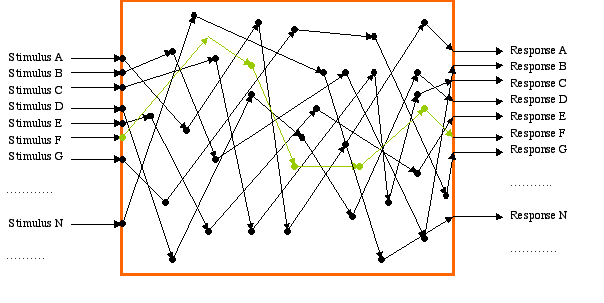
| Virtues
|
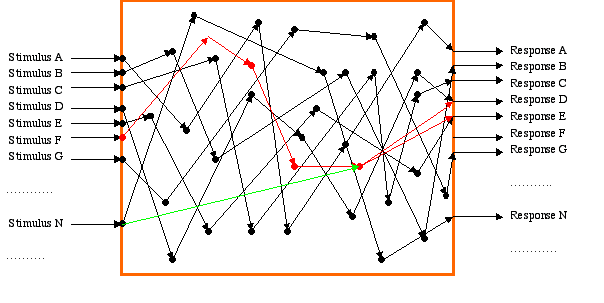
| Virtues
|
A rethinking - boxes in boxes
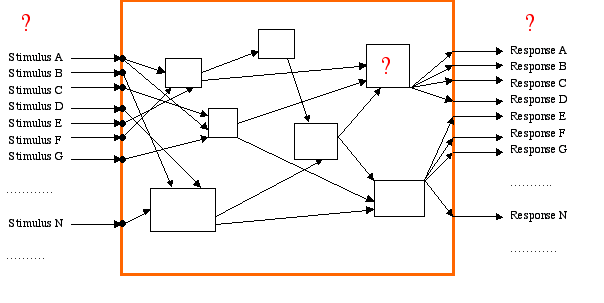
| Virtues
|
Facing up to the stereotopy, stimulus-response problem ... freeing the box from the outside world, adding autonomy
"Under carefully controlled experimental circumstances, an animal will behave as it damned well pleases"
| Virtues
|
If brain=behavior then the nervous system must not be a stimulus/response machine (nor a bag of chemicals) that is invariant and the same in everyone. It must instead be
Go on to look at actual nervous systems to see if they satisfy expectations and to
address issues ... further iterations ("getting it less wrong") to come?
The "real" nervous system - an input/output box consisting of interconnected input/output boxes?

| 
|
| photo from Kemali and Braitenberg, Atlas of the Frog Brain, Springer-Verlag, 1969 |
Each box in turn (somewhat arbitrarily) subdividable into smaller boxes (with some differences among vertebrates, to return to)
And those ... yes, "its boxes all the way down"
The smallest box: neurons everywhere
Invertebrate nervous systems also have neurons, but differently arranged - makes sense?
Neuron as common, smallest box and as input/output element, connected to other boxes
Can use boxes->boxes ... ->boxes(neurons) to show that larger boxes interconnected, in relatively specific ways (anatomical specificity) and to rigorously specify "input" and "outputs" of largest box ... nervous system itself
So ... at least parts of our box within box model real ...
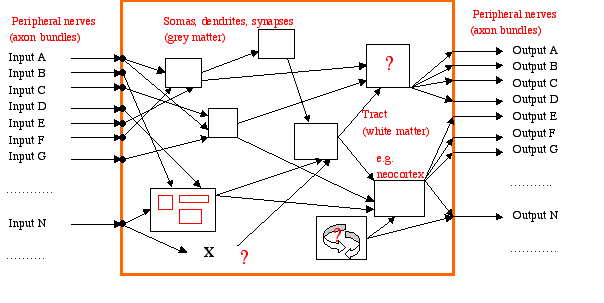
| Additions:
|
|
After learning about leeches in vitro, reading about the hippocampus in vitro, and remembering Phineus Gage, I think the brain has pre-programmed systems in different parts of the brain, which are activated from interconnections between all the parts of the brain and an executive system also in the brain. I am even more a believer of the brain being filled with interconnected boxes theory, and brain=behavior ... Aditya this similarity is not only from human to human either. So much brain research is performed on rats and other small mammals--and that can tell us about the human brain. Using the boxes within boxes model, this makes sense considering the smallest box we're considering is the same. Our differences are incredible, but it's the similarities that interest me the most ... Sarah While I find the sheer number of neurons in our bodies to be impressive, I am more interested by the idea that (far) less than .01% of our neurons are in contact with the world ... with 99.99% of our neurons being interneurons, very little of our nervous system really has a direct perception of the world. After those very few sensory neurons, everything is essentially transmitted as chemical and electrical signals with varying concentrations and frequencies ... As Emily Dickinson tells us, the mind contains the world, but it's also interesting to consider that the mind can never come into contact with this world ... the world that we "know," is not as it is in-and-of-itself (the world qua world). However, we can never know what we miss by viewing the world through the lens of our mind. I suppose this goes back to the tree in the woods question, as one may ask if the world un-perceived exists or even matters ... Ian if I have a dream about a forest is there a forest? My brain is creating the forest. Is that the same as perceiving a forest? My brain is still creating something. How is that different in a dream? What makes one forest real and not the other? ... James Is an original thought what's created as an output, with no input? ... Karen What is an original thought, and can it only be composed of other original ideas to be an original thought? ... In Descartes' Mediations, he uses an analogy to link dreams and reality that I think would like to apply here ... we understand that a painting has been created independent of things the painter has seen. For instance a satyr would be composed of a human and a goat, both of which the painter has seen, but has put the halves together to create an entirely new creature ... Rachel if Emily Dickinson had known what we now know today she wouldn't have been in the least surprised. The fact that the brain can produce outputs without any external inputs would not, I think, surprise her ... It explains why you can wake up from a nightmare with your heart racing and cold sweat pouring down your neck in the same way it would if you had really just been pursued by some terrible entity. So perhaps, the great poet is right. Everything is just a function of the brain. To the brain the dream is just as real and just as significant as physical outside input ... Alexandra the part of the motor cortex that was in charge of dealing with these piano-playing finger movements had taken over surrounding area in the five days of practicing. But the most interesting part of this experiment was in the second group he tested. In this test, instead of actually practicing PLAYING the paino, he has his subjects THINK about playing the piano for the same amount of time as the first group for five days. They were to visualize moving their fingers in the same way the first group would have, just without real movement. When he did the TMS test on these people. the results were surprising: the part of the motor-complex that controlled the finger movements had once again expanded and taken over adjoining areas of the brain. In class the other day we talked about whether or not just htinking could actually change the structure of the brain (aside from consolidating memories, etc). This is proof that indeed, it can ... a fascinating, but somewhat terrifying thought. What if you unconscoiusly are thinking of something enough that it changes the structure of your brain without your knowing? ... Its seems ...that Emily Dickinson is indeed right: we are a product of the brain as opposed to the other way around ... Caroline At the end of this article [on pseudocyesis], a doctor is quoted as saying, "The pituitary gland is located right at the base of the brain, and that's where all the hormones come from" in pregnancy, he said. "This is one of the classic examples in medicine of how the mind affects the rest of the body." Although I may just be being picky, I think that the doctor used a poor choice of words. Brain, would have been a much better word to convey the message that he was trying to get across because he is attempting to explain the body's response ( or behavior ) to an influx of hormones in the BRAIN not the mind ... What is perception's role in this phenomenon? If people did not perceive the "pregnant" woman as being such, would she go through the 9 months of symptoms and try to deliver or would her feelings subside without positive reinforcement? ... Stacy After reading Stacy's post about pseudocyesis, I began to think about other examples of specific outputs that were created without the introduction of those inputs attributed to them. In my opinion, the use of placebos in experimental research is a perfect example of this phenomenon ... csandrinic I was thinking about the boxes within boxes model of the nervous system and I came to realize that as impressive as this system of the nervous system is, what really astounded me is trying to wrap my head around the fact that this system is vastly different from person to person, thus making us each our own unique person. This idea applies to the phenomenon of pseudocyesis because as was pointed out, not every person who wants to have a baby goes through pseudocyesis ... Jessica I think that if others do not perceive the women as pregnant she may eventually stop perceiving herself as pregnant as well. This may be what happened with Queen Mary, after her first "full term" false pregnancy no one believed her and her second false pregnancy only last a few months ... Laura I believe it is the mind that has conjured up these desires, which then affects the brain and the body (much like psychosomatic diseases that are caused by a chaotic mind.) .... A Kyan Ok, so in class today, Sarah played the devil's advocate and challenged my "tree falls in the forest…" example based on perception and its effects ... so maybe I am gathering a new set of observations to revamp my original argument ... Eden exists whether I exist or not, because others are perceiving her ... But ... if my perception of Eden did not exist, then the Eden that here and now exists would not — a part of her would be lost, that part that was part of me ... dmckeever I agree that Eden will exist regardless of whether you (dmckeever) exist because others perceive her. But I think your thought on how other's perception shapes Eden's identity is incomplete. It is true that "Eden's existence is very much dependent on those around her because our perceptions of her make her who she is" but this would not be true if Eden did not have the ability to respond to our perceptions of her ... a child with CIPA will never learn directly that touching a hot stove will burn. If a child touches a hot stove, he will not be able to respond to the input and change his brain; he will not be able to change his actions/himself according to the input ... An example with Eden would be: Eden is in a group of people that do not like the subject money ... If she could not perceive the group's dislike, Eden's existence does not depend on those around her because the perception of those around her does not make her who she is. She would continue to talk about money with or without the group's perception of her. It is important to remember that it is an endless loop of inputs and outputs, which can be another person's outputs and inputs ... alexa09 what about when Eden is by herself? I guess it comes back to the same ol' "If Eden falls in the forest, and no one is there to laugh at her..." question. However, being fairly well aquainted with Eden myself, I'd like to argue that I still exist when you guys aren't around. Or at least, I perceive myself to be existing. In which case, maybe this is an argument about sentience ... even a mushroom reacts to its environment, it just doesn't "know" that it's doing it. Well, unless there's a lot more to mushrooms than we think, which is always a possibility ... Eden The organism, however, is unaware of the brain's "decision" to alternate motor unit activation. In this case, output seems to be generated with no input. However, I propose that the brain creates an input for reasons unknown to the organism's conscious mind, but known to the brain. This kind of internal reasoning or unconscious reasoning is the input that creates the output ... If the cricket chirps for reason's that he's unconscious of, it could be something his body is telling him or a prediction about what is to come. He's consciously unaware of it, despite his brain's awareness. Could his mind and body be sensing something that he isn't aware of? Is the unconscious a type of input that conveys an output? ... Lauren Seems to me that ovulating human females are equivalent to the male crickets chirping for absent females – they are unconscious actions based on some inner unknown trigger ... secaldwe What is of greatest interest to me in these arguments is that you both refer to the unconscious as something that could be perceived as being distinct from brain/ neurological function. Is stating that the above are unconscious actions ways of explaining what we can't yet comprehend about the function of the nervous system, or are you making an inference to the soul and how it operates with the brain? ... Rachel Years later, the memory will surface, and the repulsiveness of the situation will be understood by the victim, thus causing an output of certain behaviors.This leads me to wonder about the Autonomy Model of the nervous system. Although this model leaves room for inputs and outputs to not direct connect, and for living beings to react as they please, it does not explain suppressed memory ... lrifkin Perhaps there is a break in the chain of boxes that results in this delayed response to these traumatic events. Perhaps we have the ability to control inputs on a much greater level than we know or are able to comprehend ... Katherine something is missing. I just do not seem to be able to account for such things as personality and freewill. Variability in our neural connections does not completely justify these aspects of the brain, or should I say, the mind. If we were nothing but neurons and connections we would be more like robots, would we not? ... Jayme While I really enjoy this class, the vastness of the human nervous system makes me wonder what it can actually teach us, other than that the brain is far too complex to ever be minimally understood ... Cayla I think it is a bit ill-conceived to think we can map out the brain by categorizing it and putting it into boxes. Not only are there more neurons than we can count, but weren't we just saying last week how little we know about the brain? We say there is no input as the cause of an output and that may be true, but we are considering the brain in such a linear style: why does the brain have to be so straightforward and fit so nicely into boxes? Frankly, I much prefer to think of the brain as complicated until proven otherwise ... Holly And outputs without inputs... to be quite honest, I don't know what to think about that. Maybe, as Holly says, that this does not exist, and we merely are unable to see the input right now. Or maybe Kirsten is right in that we could call this our imagination. I would really like to explore this more in class, because I just don't understand how there can possibly be an output without an input ... Antonia |
Continue looking at actual nervous systems to see if they satisfy expectations and to address issues ... further iterations ("getting it less wrong") to come?
The "real" nervous system - different if behavior different?
Outputs - topographic organization - anatomical specificity
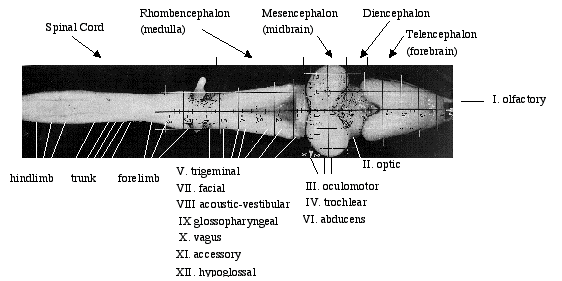
| For additional information: |
Observations "surprising", but have to be accepted - Issue is "how to make sense of them"
Two kinds of behavior ("reflex" versus something-else) intuition probably not useful
|
how can one measure behavior when, if we all have 10^12 neurons, there is so much possibility for behaving differently? How can behavior be made into a credible science when there are infinite possibilities for generalizations masquerading as truths? ... Steph I would go nuts if I had to write a paper on a book that kept changing its format as I was reading it - how can these scientists see any progress when dealing with the ultimate in incomprehensible shape-shifters? ... Sarah Thinking about people with quadriplegia or any other kind of neurological disorder, or even mental disorders and disabilities, part of me wondered why the mind cannot fix these things as well ... Jessica The effectiveness of placebos seems to depend on where on the spectrum [from "objective" to "subjective"] the illness lies. I have not read any studies showing that administration of placebo drugs results in regained movement in quadriplegia. Whereas placebos and antidepressent drugs have about equal efficacy in many trials. This makes alot of sense to me, not because depression is any less "real" but because of its subjective nature ... Rebecca Based on this article I would say that "thought" can affect matter directly although it would be more accurate to say that "thought" is a physiological process involving physiological (read: material) changes and mechanisms ... James I find it very difficult to deny the power of the mind in dealing with pain because all my life I have seen people overcome great pain with mental strength. I am really posing a question for thought: if Emily Dickinson is right, then are these differences in tolerance and reactions, which could be grouped in with all other behavior, simply a product of the structural make-up of the brain? ... dmckever I think we are making progress in having this "I-function" box and accounting for experience, but I think we need to further define the implications and assumptions that are associated with such a box ... Holly Brain damage causes loss of the I-function ... Adiya is it possible that some people's "I-functions" naturally have more control/awareness than others? ... Claire Whereas we spoke about how it is possible to receive inputs and generate appropriate outputs without necessarily being aware of doing so (in the way that Christopher Reeves will move his foot if it pinched), in this situation it is possible to believe that we are generating outputs, to simulate an output in our brain, without having any concrete input or visible output ... csandrinic Maybe the conscious and the unconscious that Freud psychoanalyzed are our I-Function ... Laura I have a lot going through my I-box right now ... Stacy Does this inner activity in our nervous system relate to our inner self? Are inner selves all the same since we all have an I function or are they different because the patterns of neuron activities are too complex to recreate in two people? ... Lauren the capabilities of the spinal cord alone continues to amaze me ... The mechanisms of the spinal cord and corresponding extremities are enough to sustain life (with a supply of nutrients and oxygen) however; they seem to be lacking the experience aspect of living it is limited in the sense that if you tickle the frog in the same way it will most likely produce the same twitching behavior ... This descriptions seems comparable to a machine, and machines are not usually thought of as experiencing ... It is still unclear to me what the actually process of experiencing is; this is merely an interpretation of information. I am also unclear on how information is stored in the form of memory. In general people learn from experience, but in what form is this experience stored? ... Rachel |
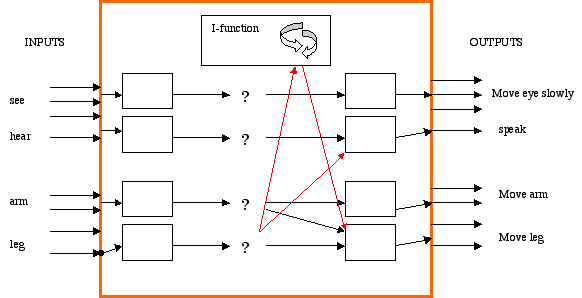
| Ascending somatosensory
pathways Descending motor pathways
|
If its all sensory neurons, motoneurons, interneurons, and signals moving among them, we need to look at signals, what they are, how they're handled ...
Signals:
Action potential - longitudinal battery which appears/disappears successively at successive points along an axon ("travels" at finite speed), "all or nothing" transient (millisecond range) event
To understand action potential, need first to understand resting potential - transverse battery, continuously present, with potential for continuous variation
| Organization based on random motion |
Propagation
Notice it is NOT matter moving, nor energy, it is a perturbation (signal, information) |
Will propagate if started. How affect things? How started? Need to understand synaptic potentials, receptor potentials, but first ...
Lots of things can start it. Among them is something that provides answer to one of our box questions ...

And the big question ... Do signals actually start in the middle of the box? If so, how?
Yes, not mysterious, follows from what we know, if we add possibility of some differences in permeability of some membrane regions not mysterious, has interesting implications ...
Go on to receptor potentials, synaptic potentials (how action potentials affect things, how boxes integrate, how signals stopped in box)
Input (sensory) signals - an example
|
I understand how action potentials cause movement and reaction to outside stimulus ... but how do thoughts cause action potentials? I've learned about action potentials several times now in my biology/psychology career and this point always gets me ... AriannahM
I always though that whether I was attracted to someone depended entirely on my opinion of them and their personality I guess I have less control than I thought. Emily Dickenson wins this one ... Laura I do think it is interesting to think that action potentials may in fact be the limiting factor in our sensitive and experiential reality ... Holly After the tsunami hit, there was a lot of talk about animals and their "6th sense." It appeared that animals were afraid and acted strangely before it hit, as if they new something was about to happen. It seems reasonable that receptors could explain this phenomenon ... francescamarangell Society as a whole does seem to be constantly searching to be more "in touch" and "in tune" with themselves, their lives, and the world around them and beyond them. And, perhaps even more surprising, is the success and fulfillment that many claim to find when these connections are made, when they find a way to perceive what has previously been beyond their senses. If we are truly equipped with "nothing more, nothing less" than needed for survival (Aditya), why do so many strive to perceive what is beyond their own senses? ... Meredith maybe we're much, much less advanced, in comparison to other organisms, than we think are ... Karen Proprioception, termed the "sixth sense", is the unconscious perception of movement and spatial orientation arising from stimuli within the body itself ... RachelBrady What I find interesting, is the small portion of what we're able to percieve that we actually pay attention to. We are not always aware of the clothes on our backs, but if someone brings your attention to it, "Hey, your shirt's on backwards," you become extremely aware of it .... Think of an autistic child who hates going to the grocery store. He is so miserable because he can sense the light cycling in the flourescent lighting, almost like a buzz, and is acutely aware of all the people surrounding him, moving around, talking, making noise ... He is experiencing more of reality than I would in that grocery store ... Sarah Are our senses meant to be completely separated or are we meant to experience everything in a way that engages all of our senses? ... kjusewiczh it occurs to me to wonder why, if it is possible for the brain to create its own action potentials and stimulus, is it not possible to experience things for which you have no outer receptors ... alexandra mnuskin How does one with no arm experience the sensation of that non-existent arm being pinched? ... Stacey I started thinking about people who claim to be able to see people's "auras" that surround them and what color that person emits. I don't think I disbelieve that people can do this, it seems to me just another sensory cross-over like the people with synesthesia ... Jessica Wurtz what is it in our brains that allow us to sense what is occurring in other people? ... AKyan |
Reminders about receptor potentials and implications:
Synaptic potentials - Synaptic integration
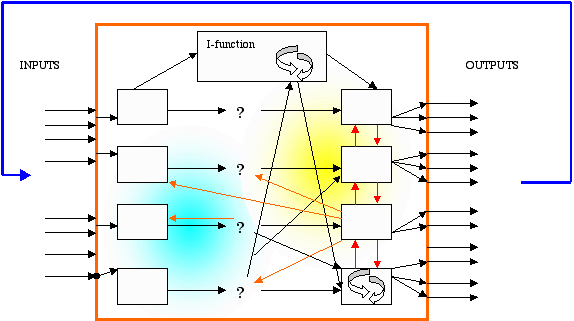
Seeing where we were, where we are ...

Problems solved, new issues raised ...
Begin (non-traditionally) with output - "action" (since not all outputs can be accounted for by inputs and, it will turn out, outputs can affect both inputs and the processing of them, the nervous system, like science, is "loopy")
|
Action = "motor symphony" A new concept: the reafferent loop Accounting for motor symphony
| 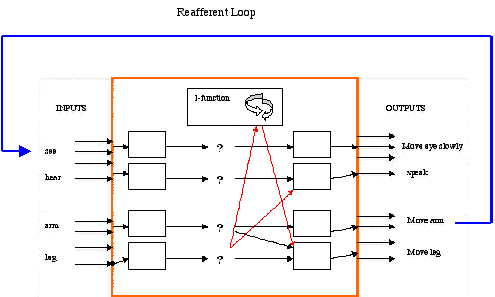
|
Preliminary human evidence?
Looking more closely at the "central pattern generation" hypothesis
Implications of earthworm case
|
when we learn new things our brains are continually making new connections, yet here we are talking about erasing those connections which lead to problems. When we are able to both create and remove connections within our brains, will we then each have our own "designer" brain? ... Leigh
a rather common and growing social faux pas which virtually all of us are guilty of committing from time to time. Classified under the umbrella of the developing field known as social neuroscience, this phenomenon is called flaming, or more technically "online disinhibition effect," ... Meera to gain some insight into what we've been referring to in class as the "I function" (the article uses the phrase "executive or cognitive control"). What this study suggests is that, although we know very little about abstract thought and its analogues, the responsible neurons are physiologically situated in the prefrontal cortex ... James brains in love and brains in lust actually look very different, exposing the fact that love and lust are stimulated in different parts of the brain ... Steph I wonder if creative thought - as in inspiration" (in dance, theater) - has any pre-programmed movements just as reaching for an object is imbedded in our nervous systems ... secaldwell epilepsy further exemplifies the complexities that are responsible for behavior and also the minute amount of understanding we have of them. We know that these excitatory and inhibitory synaptic potentials exist and work most of the time, but they don't work the same way or right in anyone. There are still more questions out there about behavior and how everything works together (or for that matter, doesn't)... Holly After reading about the ability to loose one's sense of proprioception, I then discovered two instances in which the human sense of proprioception can be tricked into working when it is not needed ... amputees describe pain and sensation in the place where a limb has been removed years after surgery ... lrifkin there are also less extreme cases of the loss of sensitivity to the proprioceptors, such as aging and muscle or joint injuries ... Studies show that after three months of regularly performing movements aimed at sharpening balance, the vast majority of elderly subjects restored a level of body control and posture stability ... the only way to stabilize the proprioceptors, which are in charge of unconsciously perceiving movement and spatial orientation, is to make a conscious effort to do so. In other words, the actions go through the I-function box rather than skipping it. ... csandrinic if someone throws something unexpectedly at you, and you put your hands up to cover your face, did YOU put your hands up, do you remember thinking about putting your hands up? ... another part of my nervous system sensed the danger before my ibox did ... How much control do we have our bodies? ... Aditya |
CPG from genome/experience/combination - is interconnected neurons
Location (back to crayfish)
Motor sympony lacks a conductor - coordinated performance of independent players (cf. Boids, flocking, fireflies) - efference copy = corollary discharge
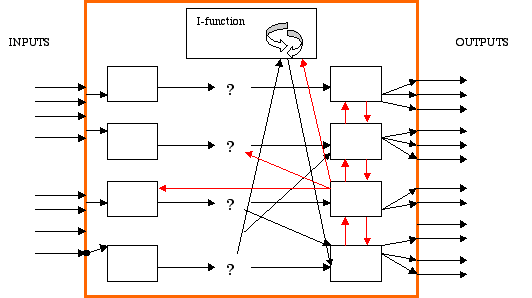 Look at some more uses/implications of corollary discharge:
Look at some more uses/implications of corollary discharge:
|
I have always thought that the brain was the "central hub" of the nervous system and that the neurons must send signals through the spinal chord. Now I see that organisms have central generators that are not located at or near the brain. They act on each other and not through a central hub of information. I have seen that we can experience phantom limbs that we think are there but it's because the nerves think that they are there. I was so confused in class this past week because my brain couldn't wrap around the fact that we can feel what is not there ... being wrong has never felt so right ... eshuster
I am still very confused about the I-functions role in all this ... Are things corollary discharges something that we are not actually aware of - something that goes on inside without our thinking about and experiencing it? ... I confess I've always believed, perhaps subconsciously, that there was some unifying force, soul, I function, in short--the self that which qualifies you as a thinking and reasoning human being. Is that not what the I-function is? How many of these semi-autonomous parts have to malfunction for you to be considered damaged or even dead? It seems that there is no longer that distinct line between life or death, sanity and insanity ... alexandra mnuskin What are some natural neuromodulators that affect central pattern generated behaviors in humans and can these be artificially modified in order to enhance behaviors? I'll keep looking ... RachelBrady prior to class I was one of those people who would just assume an amputee complaining of limb pain was crazy ... while I understand that the basic underlying cause of motion sickness is that there is a disagreement between the sensory input and the corollary input that the brain is receiving, a few questions remain ... do sensory inputs originating in the eyes have greater influence on the brain than inputs coming from the skin? This question also came up in the discussion about phantom limb pain ... why don't the sensory signals correct the corollary signal? Something that completely stumped me was the condition known as "mal de debarquement." This is when one feels perfectly fine on a boat at high sea but becomes nauseous and disoriented on steady, dry land. Can anyone think of an explanation for this? ... Stacey Blecher It seems logical that immediately after you got off of a boat you might still feel like you were rocking because your system has gotten used to the sensation and has synchronized itself with the rocking motion; when you get off, it takes time for your body to adjust to its new surroundings. What really confuses me is that this condition can last for months or years ... katherine (see also secaldwe and Jessica Wurtz and lrifkin) If you are mute, and you pretend to scream, will there be a signal that gets sent to your auditory neurons? Will they desensitize themselves even though you are not capable of making any noise? ... Do mutes experience discomfort in the part of their body that expects to receive a signal but doesn't in the same way that an armless person will experience discomfort in the area where their limb should be? ... csandrinic We are all equipped with generally the same brains, with the same parts and connections, capable of the same functions yet we are all so different with regard to personalities, skills and talents, and preferences. I personally think the variability of central pattern generators and how corollary discharge signals interact in each person might explain this ...Does trying to explain these individual differences with central pattern generators and patterns of corollary discharge signals seem too farfetched? Aditya I find myself thinking about what is behind muscle memory. I think that it is very clear that we use muscle memory every single day. We don't think about how to walk, talk, or write. Does msucle memory completely cut out the brain and just rely on the motor neurons connected to the muscles in question or is it happening so fast that we just do not realize that our brain is being used? ... kjusewiczh
|
Have some useful "boxes"/concepts from thinking about output side in terms of possible origins of motor symphonies ... and some new questions
Output affects input ... input affects output?
Let's reinstate reafferent loop, see what new things that gets us
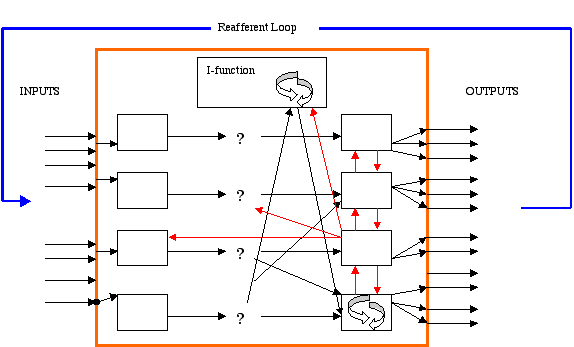
Stretch "reflex"
| rudiments of "choice", "purpose" without I-function
generalizations of CD: "expectations", inputs interpreted re them performance anxiety as CD inhibiting existing capabilities? |
Have motor symphony, central pattern generation, corollary discharge, "purpose", "choice" without I-function
What more from motor side?
Many more boxes/tracts relevant to output side of nervous system (alternate)
Cerebellum, basal ganglia as "loops"
|
Am I just a product of my brain? If this is the case then it seems like I am not even an autonomous individual. I am willing to accept the idea that the mind can be in total control of the body but I want to believe that I can also identify with my body. This is becoming increasingly difficult to do as I progress through this course ... jpena I'm starting to think that after taking this course, I'm going to ultimately come to the conclusion that our own conscious thinking has very little to do with our behavior ... michelle I am growing equally worried that free will doesn't truly exist... dmckeever
|
Role of motor cortex?
Recapitulation: (looking back)
 |  |
Lessons learned "from the output side":
|
At the risk of sounding spectacularly obvious, it's a strange concept that we sometimes can't control our own bodies ... Heather (see also LS on sleeping pills, AriannahM on obesity) Who or what is really in control here? Right now it seems like the I-function is batting cleanup for whatever doesn't fit nicely into our already developed scheme ... I have to ask, where is the I-function located? Does it have a physical location or is it something within the different parts ... We think of purposeful actions and we like to assume that we have some control over it .. I'm not sure what role the I-function has in our purpose, both our executable purpose (day-to-day activities) and this idea of ultimate "purpose." It seems to me we are at a point where we need to identify who is really in control here ... Holly Stewart the implications of choice on the concept of learning creates another "catch 22" in the understanding of the brain and its workings. If, in fact, we do choose learning, we would be capable of making a choice to alter our own brain structures. And if we were capable of such alteration, then we would be capable of controlling changes in the brain's generation of outputs. Thus the control would be back in our own hands. However, if we do not have a choice in the matter of learning, if the structure of our brains really do take control of those actions, then the brain itself would be causing its own growth and altering its own outputs ... Meredith Sisson Isn't anyone else disturbed by this idea that many of the actions we take that we thought were acts of free will and of choice may actually be behaviors, or responses to patterns of action potentials, automatic responses to a stimulus coded for by the pattern generators pre-existing in our bodies?! ... I have had more time to think and so I am more terrified of the possibility that everything I do is dictated by some biological mechanism - even writing this post may not be a choice I am making; it may be voluntary because as far as I can tell, I want to be writing this right now, but may have been the only possible response to the discussion we had in class (the input), which triggered thoughts in my mind that resulted in this ... dmckeever while I do share the concern that my actions may not be the products of my free will, I must also recognize that I could not have the functional autonomy that I do have, as limited as it may really be, without the heteronomous input from the rest of my body ... Ian Morton convicted murderers had reduced glucose metabolism in their prefrontal cortex and people with antisocial personality disorder had significantly less grey matter in their prefrontal cortex. This brings up the idea that the cortex which potentially allows for the I-function to function, if damaged or is not functioning properly, might influence or not inhibit our natural inherent actions, and things like spastic paralysis, or as Raine suggests, violence occur ... Can we ever not hold people accountable for their actions if their cortex is not working properly? ... Should we be further researching these findings, are we just giving criminals an excuse? ... Aditya (also Lauren Poon) |
Coming in from the sensory side
Expectations of what will be learned "from the input side"?
Interesting extensions of central origin of perception
|
Vision as a paradigmatic case (is it? ... is at least best studied, and shows some general principals)
"Imaging" - essential role of non-neural structures
Picture on retina and picture in head very different
|
Yesterday, I had to spend all day driving to Connecticut to pick up my car and while driving back I was contemplating vision and what I was seeing and what my brain was "filling in." It amazed me to think that the other cars, the road, my steering wheel, everything was a just points of light, two dimension images on my retina that appeared to me as three dimensional images ... LS It was "revealed" to us last class that the picture in our heads is larger than the picture on our retinas... Shouldn't we have already known that? Our eyes are so small, and our brains are supposedly "wider than the sky," so it shouldn't be difficult for us to comprehend that the retina picture is smaller. However, it's uncomfortable to know that picture transmission from retina to brain is done completely without the I-function ... Sarah Harding if the human brain is capable of generating and perceiving mental images without receiving input then I have to start questioning reality in terms of what I am seeing. Can I really trust my brain to give me an accurate image of what is in front of me? ... jpena It may in fact be the sensory system that has dictated our experiences within reality ... Holly Stewart Emily Dickenson's poem claiming that the brain contains everything is not completely accurate. One brain cannot contain another brain. Although it can control one's perception of the world and their behavior, and the world only exists because of the brain, someone else's brain can contain a world completely different. Therefore reality is comprised of everyone's joint perceptions of it ... Michelle |
Look in more detail at retina and interconnections to get more idea of how much picture in head is "made up" ... and why
Why are people so concerned about "reality"?
Reality is average with standard deviations Theater performance (or strobe) as metaphor
|
Thinking about imaging/lateral inhibition/brightness implies:
How to tell less wrong stories (guess well): using multiple perspectives ... to add depth
| Binocular stereopsis resolving conflict | But ... creating ambiguity |
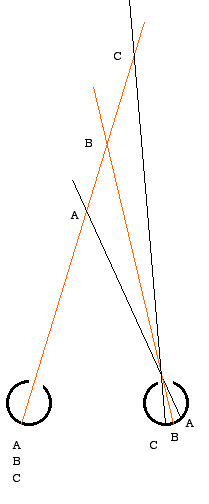 | 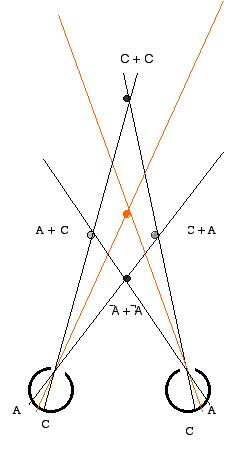 |
Better "picture" by making use of multiple perspectives, accepting/making use of "conflicts"
Ambiguity as fundamental in seeing, sensory systems generally
Can be reduced by using multiple cues, not eliminated (a "useful" gap?)
Ambiguity as fundamental in seeing, sensory systems generally
Can be reduced by using multiple cues, not eliminated (a "useful" gap?)
|
Illusions are not something abnormal that cloud the "normal" perception of the real world ... should be anlyzed as part of the normal perceptual process ... RachelBrady my brain isn't meant to perceive things as they really are. It's meant to perceive them in a way that is most helpful to my survival ... Claire Ceriani I think it isn't really necessary to consider what the world is like outside of our experience of it, since that is really all we can know (Kant also takes this viewpoint) ... Holly For me, my consciousness IS my reality. I would argue that you have to be conscious to have a reality, so these two concepts are interchangeable for me ... AriannahM [Tyler's] cure to the gaps in knowledge ... is hermeneutics. He proposes abandoning epitemology and embracing hermeneutics since the gaps in our knowledge are an unavoidable part of life ... In some sense, all our experiences are mediated... James Damascus No two humans are living and perceiving a different world ... Lauren Poon The problem I have is with the variation from person to person. If we are all creating our own constancies in our own realities, there is a lot of room for variation. But there doesn't seem to be that many differences in the observation of 'reality.' Does the blue that I see look like the blue you see because we were both taught that that specific wavelength of color is called blue? Or are we truly experiencing the same color?I believe our realities are the same from person to person ... Sarah Powers (see also Pleiades on color) It is amazing that our brain is able to see things in multiple different ways. But do we just assume that everyone is seeing the same thing or are we all really seeing the same thing? Perhaps we all just think that we are describing and looking about the same thing the same way; it is only until a picture such as the skull/woman is presented when the difference between what we see comes out... Katherine (see also Aditya) Basically, this class, by making me question reality, has made me a little more open to the idea that people can hear, see, or sense things that I may not be able to hear, see, or sense. I'm a bit ashamed to say it, because I really do like things to be clear, "experimentable on", etc. But maybe this is good... maybe I'll start looking into subjects I would otherwise have ridiculed ... Antonia J (see also eden and Steph Herold on auras) Two heads are better than one, not only for the combined thinking power, but also because one person can see something different/differently than another, opening up more pathways to an answer. So when people say, "We just don't see eye to eye", are they really not seeing the same things? And does this type of variable perception apply to the way people think as well? Is the i-function's ambiguities responsible for things that are considered creative and inventive? ... urbrainondrugs |
This is not yellow |
or
Is color an aspect of physical "reality" or "made up" by the nervous system?
Physical "reality"
|
My [chemistry] professor said color is the result of hyperconjugation. Conjugation is when there are double bonds every other bond. When there are multiple conjugated structures put together, the structure is said to be hyper conjugated. This puts the pi orbitals close together. The proximity of the orbitals allows visible light to promote electrons which in turn causes "color". To me, this is a physical property; compounds that are colored are actually hyper conjugated. I understand we only experience the colors because of the way our vision works, but isn't the property physically there? ... AriannahM So what is reality then? In class we said that color is not an intrinsic quality of objects. I disagree. Because what is color? Color is directly related to the wavelengths of light adsorbed by an object, which is directly related to the energy of bonding systems within the compounds that make up the object. These things are fundamental to the object, regardless of whether or not they are perceived ... Without brains walking/crawling/swimming about, the world would be exactly what our nervous systems know it is: a bunch of forces, elements, light waves, pressure changes, electrostatic forces, masses, and magnets that interact in an incredibly intricate manner ... Eden If colors are only a creation of photoreceptors and our brain, then why are they used to signal harmful toxins and protect certain animals throughout nature- not just to humans? ... Sasha Actual sound occurs in the presence of two bodies and a space between them (filled with air, water) -- a body producing the sound, a space through which the waves can travel, and a sense organ. In other words, a single body cannot produce sound, as there must be a second body for the first to affect, a body for the produced waves to strike ... Ian Morton There is so much going on and under the control of the brain I am just amazed ... However in terms of the tree in the woods question, I do think that if no one hears the tree it doesn't make a sounds, but this gets trick in other cases and makes me uneasy. For example when I leave my dorm room in the morning ... does my dorm room cease to exist because I no longer attend to it with my visual system? I have a hard time believing this, I just do not know why. Maybe it is because I perceive it with my mind. When I am not with my friends they still exist even though I am not "seeing them" right ... at least I think so! This happens with people who have died technically they are not still here but we still are perceiving them and remembering them…what does this mean then? ... LS Berkeley would certainly agree with the premise that if a tree falls in a forest and no one is there to witness such an occurrence, the tree does not make a sound, this account would not be sufficient. He would go so far as to say that not only does the tree not make a sound, but also that there is no tree to begin with ... Meera Seth Just because we can't tell its there, doesn't mean a) it isn't, b) it isn't useful to something else perhaps in some other way ... Pleiades if every organism with the requirements to see and interpret the color of the world all closed their eyes at the same time, the world would suddenly go devoid of color? ... What about the world before there was life that could perceive color? Was nothing colored then? Were the skies and oceans and primitive plant life colorless simply because there were no eyes and nervous systems yet? I find it hard to believe that when those came into being, suddenly the whole world changed because of it ... Jessica Wurtz Whether our nervous system can process them or not - the waves and chemicals the tree gives off are the same --- they are intrinsic to the tree. What is not intrinsic to it--color, sound, smell is simply the way that the majority of people perceive it. It is just an evolutionary useful way for us all to function together ... Alexandra Mnuskin the implications of saying that there is no sound if a tree falls implies that we have not truly understood sensational reality, but we have begun to understand sound/vision/our experience within reality ... Holly Stewart
Even before taking this course I have wondered whether color is perceived by all in the exact same way. But now I don't feel like I have to wonder about that anymore because I am leaning towards the opinion that color is a construction of the brain ... I've also thought about my ADHD which makes it hard for me to block out noise distractions sometimes ... we have one disabillity, color-blindness, that limits input and another that fails to ignore some unwanted input. Both of these are "disabilities" but for different reasons so it seems like "disabilities" could be a social construction. People who sense inputs in ways that deviate from the average are said to be disabled. But where do we draw the line between disabled and different? ... jpena I definitely agree that disability is a social construction. What interests me is that many times when people are disabled--according to society - they often have developed other abilities beyond what is considered the norm ... these people are not disabled, but merely differently-abled ... katherine Standards are made in order to allow societies to function, however how are these standards set, for it could not be due to an overall consensus. Every "I" sees green slightly differently. Another example would be grades. Who is to say that a paper really is an A paper or a B paper? Is it really fair to proclaim a standard for, say, an english paper, where the reception of it can be so very different between two people? ... urbrainondrugs there ARE differences in perception which are dangerous. And I think that labeling these differences is important for the sake of the people themselves, and finding them treatment, and protecting others around them. This process of labeling is very difficult, and I don't know if it's the right way to go about things - but I can't think of anything better ... Antonia J I believe in my personal definition of "disability", which is when the mind handicaps itself from doing good things and overcoming the bad ... A. Kyan
our reality is an educated guess of the brain that is continually checked ... how far can we push this idea? Can our mind fill in more complicated occurrences, such as movement? After all we perceive an object as having continual motion even when part if its trajectory is hidden from us, and not as two independent motions of a single object ... RachelBrady Can we understand some dreams as being reflections of those things which are not observed in the 'real world', but which occur and are interpreted in our sleep? That is, what if some dreams are a mechanism for that which is unobserved/witnessed to be experienced by us while asleep ... Darlene Forde |
Reality always an hypothesis, checked and rechecked ... ?
Where IS "picture in head"? ... where/what is I-function?
Multiple ganglion cell types - frog
Retinal projections ... another ... another
Moving on to neocortex
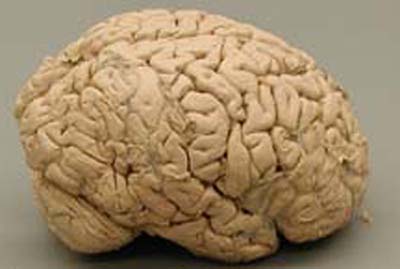 |
 |
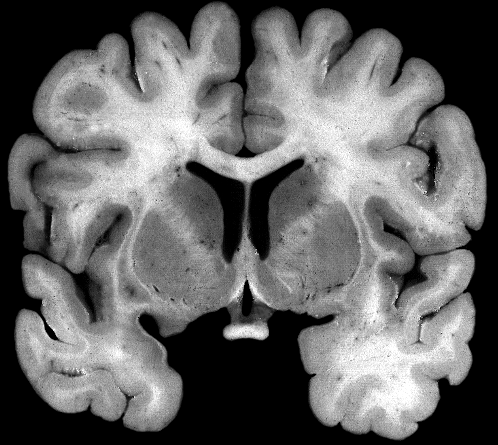 http://www9.biostr.washington.edu/DA-ATLASES/Neuroanatomy/gifs/Forebrain/Coronal%20Slabs/f60eb.gif | 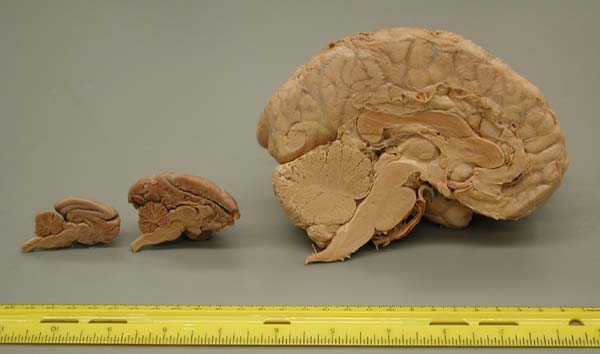 |
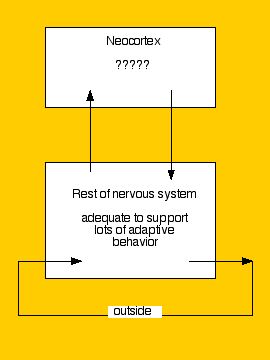 Visual Cortex - binocular convergence, altered "feature" detection, columnar organization, topographic organization
Visual Cortex - binocular convergence, altered "feature" detection, columnar organization, topographic organization
Blindsight and its implications - Don't NEED "picture in head"
|
I was having a conversation with my friend who is an english major about how she, as an english major, views human nature. I thought it was very interesting, because, if I understand her correctly, english majors generally discuss the self as if it were an etherial essence of some kind, and that human behavior is a result of various repressions of this due to societal pressures. When I mentioned that in this class we basically argue that everything is a product of the physical entity that is the brain, that there is no etherial "self," she was shocked. She said that if someone tried to argue that in her english class, they would probably be shot down by everyone in the class. I thought this was fascinating, because pretty much the exact opposite is true in this class (though perhaps not as extreme.) I think its pretty neat that different genres of subjects view things completely differently, and I see a lot of value in that. Sometimes I think it would be good for me to go sit in on an english class and hear someone argue the opposite case ... eden I have never second guessed my perception of reality because other people seem to have drawn similar conclusions. It is not as if we have to constantly ask if we are seeing or experiencing the same thing. The majority of the time, it seems like we come to a general consensus about what is going on and what we're looking at ... Katherine I am not disturbed by the fact that we are not experiencing the world as it "truly exists" because frankly, I am existing happily without that knowledge. I am able to interact with others sufficiently and appreciate the world to an extent with which I am happy ... dmckeever I am interested in the problems other have with this idea. To me it seems pretty...logical. We perceive the world via mechanisms that are appropriate for the behaviors we carry out. We dont have receptors for magnetic fields because that information is not particularly useful to the way we live. Humans typically find a good spot and stay there. We do not cover large distances and therefore do not need the unique navigational devices some birds have developed. The sound range we are able to experience is determined by the sounds relevant to our lives, human voices, tiger roars, baby cries, trickling streams, a mosquitos buzz. We make things up because there are gaps, and since on the large, things are predictable, we are able to fill in the blanks appropriatley. Whether or not there is an out there out there is pretty irrelevant for our lives. Who cares? As long are we are able to function as an individual and a society the existence of an objective reality has no real consequence one way or the other ... I guess I am questioning the merit that could be found in experiencing "more" "all" or "true" reality ... Rebecca Pisciotta I'm missing the passion that others in the class have on this discussion. To me, it seems like we are directing our energies toward something that is interesting and fascinating, but at the end of the day, does it really matter? ... AKyan I think people should feel comfortable with (and appreciative of) our ways of perceiving the world. It is ideally suited to the way we live our lives. Or alternatively, we live our lives in ways that are ideally suited to the way we perceive our world ... [but] Perhaps there is both truth and reality in those perceptions that lie more than 1 standard deviation from the mean. If so the true 'enlightenment' may lay in developing a richer understanding of the many different methods by which we are currently capable of understanding the world, drawing readily on these different ways of seeing while recognizing them as valid. In short, let us redefine our epistemology ... Darlene Forde I realize that most people purposely alter there realities on a somewhat regular basis. This is, after all, exactly what drugs and alcohol do ... Even prescription medicines like anti-depressants or over-the-counter pain relievers are changing the way we think and perceive what is going on around us and within ourselves. It's almost as if people are more inclined to try and get even further away from some universal reality than to try and find it ... Caroline Wright I want to know what we aren't seeing. Maybe there are no monsters lurking around, but I have started to become very frustrated by knowing that there are whole spectrums in existence that my body does not have the sensors to detect. Not only that, but I am curious about what my body DOES detect and does not pass onto my I-function ... Molly Tamulevich It's interesting to think about people using drugs or alcohol to alter their realities. I've always thought of people using them to escape from reality as they see it. As far as drugs like antidepressants are concerned, I've thought of them as a way to bring people back to reality ... This might no longer apply if reality is defined in the individual by what the brain creates ... Giving him medications to correct his disorder would not necessarily return him reality, but merely change it into something closer to the norm or average ... jpena this theory states that depressed individuals actually have a more accurate view on the world and their abilities. Non depressed individuals tend to over estimate their abilities and have a less realistic grip on reality. I just always liked this theory because it does show that reality is individualized to every person and that things may not always be as we expect ... LS Making it up. Playing house. Using our imagination. These are activities we play as young children and then believe that we can grow up and grow out of it. It wasn't until last week when the belief that I don't do those things anymore all changed for me. Even if we tell ourselves we need to 'grow up" and we are too old for playing imagination games, our brain has other ideas. Our brain is constantly imagining ... The craziest part about all of this is when we think about the role (or lack of a role) the I-function plays in all of this ... something creative and requiring interpretation (i.e. the picture in the head) which I would assume to go through the I-function doesn't. It definitely seems a bit counter-intuitive. The I-function isn't needed for perception!?! We only need it for accessing this visual information and being conscious of it. I am not yet sure what this says about experience and the I-function's involvement in consciousness and thus reality. It seems like reality may in fact be out of our conscious control and is a byproduct of the nervous system. We can then only access this byproduct via the I-function; each of these conclusions seem a bit wild to me ... Holly Stewart The question that remains - the aspect that bothers me a little…is the fact that the brain does all of this completely independent of the I-function. What then is the I-function for? ... Alexandra Mnuskin it's pretty clear that any attempt to indoctrinate people against a basic human instinct has very little contructive impact. Even when powerful institutions such as religion and morality come into play, the trend seems to be that people end up having sex before marriage no matter what ... That being said, what does this mean for any attempt to reform human nature? ... Steph Herold We can, if we really want to, abstain from eating and ignore hunger pains. There are stories of mothers subjecting themselves to normally intolerable amounts of pain to rescue or protect their children. Despite all of our recent talk on how we have little control over our behavior, I do still believe humans have to ability to override biological demands should feel strongly enough about the cause. What we have to do first is convince our brains to comply. For example, I've spent years trying to convince my father to quit smoking- giving him statistics on lung cancer, etc. However, he never actually quit until he personally made the decision to do so. Our brains will only comply if it is our OWN conscious decision, not that of others, because only we know what's best for ourselves. Therefore, maybe the only thing we can do is present all the facts to the students and hope they decide for themselves to make appropriate sexual decision ... Michelle
|
Blindsight and its implications - Don't NEED "picture in head"
 Lessons from sensory side ...
Lessons from sensory side ...
Emotion, feeling, personality, self?
 "generalized control mechanisms"
"generalized control mechanisms"
|
I have noticed that weather seems to be a very strong control on people's moods. From the time I was young, I always associated the sun with happiness and rainy/cloudy days with being sad or upset ... a visible notice can be observed on campus when it gets sunny. People sit outside in bright colors and have fun. Everyone seems happy and it seems like everyone is smiling .... It has been observed that in northern regions where the sun is not visible for months at a time, the suicide rate is enormously higher than in other places. What is it in our brains that senses the change in weather or sunlight and adjusts our moods. Is there an actual connection between the weather and our moods...or is it a learned connection that we all adhere to? ... kjusewiczh I'm the opposite. I love the rain; it makes me happy when it's raining. What does this mean about my internalization of these cues? Obviously they are going in the same, but there is some difference in my unconscious processing that makes me behave in opposition to the majority of people. What is it, and why am I not standardized with most everyone else?!??! ... Pleiades After class on Thursday, I was having a conversation with a fellow classmate about the role of depression in society. She said that now it's chic to suffer from depression, that it's often glorified in our culture ... The image of the depressed or manic starving artist continues to flourish. (She suffers for her art [or music, or theatre]. Don't mind him, he's an artist.) I live with two people who suffer from depression; my sister was just recently diagnosed. For me, depression is something you deal with on a daily basis ... I've never really considered it within the bigger picture of society. It's true that depression does have a societal stigma surrounding it. Being depressed implies some sort of failure on the part of the depressed person. (Why can't you just feel better?) In reality, it's just a chemical imbalance in the brain. Even the term imbalance has stigma attached to it--implying that something about the brain is abnormal, but if the brain changes its chemical balance from outside the range of 'normal' I think there has to be some reason ... Sarah Powers I strongly agree that it seems that the number of people who are diagnosed with depression is higher than it was in the past, and this indeed could be because it is glorified now in our culture and the connotations of such ... A lack of acceptance and admittance could have lowered the numbers in the past for it was not as "accepted" to have such an emotional disorder and therefore less people would tell of their depression and the disorder would go unmarked ... the number of depressed people of the past may have in fact been lower than the number of depressed people currently, because the societal influence forced them to deal with the disorder in a certain manner which has proved effective in curing depression ... Does society play any role in this idea that medication is the answer? I feel that if someone is truly depressed that medication cam help, but should not remain the sole method aimed toward ridding the person of depression. What would be the most beneficial society in terms of helping those who are depressed? ... Alex Hansen I'm compelled to out myself as someone who has been diagnosed with depression ... Lack of recognition of depression would definitely not be a "cure" for it ... Medication for depression does not work for everyone, you're right. But it has helped SO MANY people (myself included) ... a patient who's diagnosed with depression isn't automatically put on a drug. She may go through a lot of therapy first before drugs are even considered. Second, there are many types of drugs that have different affects on different people, which means that usually, with enough patience, someone can find a drug that will help her. Third, people with depression NEVER only take the drug they are prescribed. You have to take the drug AND be in therapy at the same time. You are also told to do physical activity as often as possible, since, as you noted, this can help ease some parts of depression ... In light of how mentally ill the gunman at Virginia Tech was, I think now is an important time to get the RIGHT information out there about depression ... Steph Herold Mood as a generalized control mechanism means that we have coordinated nervous system activity ... And furthermore, we recognized in class that it isn't just about coordinated nervous system activity, there is a fundamental feature of a degree of autonomy ... Autonomy: what does this word even mean any more in the context of what we have learned over the last semester about the nervous system? How can we maintain autonomy when we can't even recognize if there is an 'us" distinct from our nervous system? Sometimes with mood and emotions there is I-function input and sometimes there isn't. When there isn't I-function input you don't recognize that you are having an experience since your experiences don't manifest themselves under conscious control. How can we really maintain this ‘autonomy' when most of our behavioral mechanisms and responses are byproducts of nervous system action and dialogue? ... These generalized control mechanisms have a large impact also on how we view people's behavior. We briefly discussed the idea of intoxication as an example for showing that the conscious activity and unconscious responses are in a constant dialogue with one another ... I wonder if there is some sort of 'core" of ourselves which is relatively unchanging in the I-function and then the details about how it manifests itself is filled in by the context of our environment ... Holly Stewart No one appears ready to give us the Choice (yes, with a capital C) to feel... perhaps in fear of what the consequences might be? ... Long before I entered a class which delved into (and gave name to) my brain's I-function, I'd always understood emotion to be defined by it's spontaneity. Perhaps it was because, in a family coping with several diagnoses, I'd been told from a young age that "my feelings were not my fault." Emotion, to me, never required any justification. Reflecting now, I see that despite this belief, other influences along the way must have taught me otherwise. If I truly believed I had no control over my emotional state... would I pay to sit on someone's couch one a week to hear what she had to say about the way I'd been feeling over the past seven days? Or would I just swallow the handful of pills she instructed me to take every night before I collapsed into bed and not ask any questions? ... Ask any MD, psychiatrist, or psychologist, and they'll say that the best treatment for anyone suffering from any mood or personality disorder is a combination of psychotherapy and medication. However, where this line lies remains fuzzy ... And returning to the broader question of autonomy... Is there any mechanism by which to determine when and if our I-function were to be consulted over certain emotions in certain situations? Could control over emotion be fluid? Could we have control of an emotion... lose it to our unconscious for a time... and regain it again? Is there really any Choice in the matter of emotion at all? And is the more frightening proposition to lack the control... or to have it? ... Meredith Sisson I think it's very interesting to question the meaning of autonomy in the context of this course. I feel like everything we've learned this semester has challenged my previous understanding of autonomy. It seems like our brain is in control of every action we take and every emotion we have ... When, if ever, are we autonomous? The idea of creativity contributing to our autonomy is very encouraging but I can't help but question it ... in our dreams, it seems that if our brain strings together memories to create a story, our brain fills in the holes of the story with its own thoughts. So maybe it comes down to whether we feel autonomous or not as opposed to whether we are autonomous or not ... jpena I am a very pragmatic person. If something exists, it must exist for a reason, it must be serving some purpose. I can think of a reason for the existence of nearly everything. The heart exists to pump blood throughout our bodies. Boots exist so that our feet don't freeze off when we trudge to class in through the snow. Movies exist so that directors, actors, screen writers etc. can make a living (and as a side note, sometimes they are also entertaining) ... Dreams, however, seem to serve no necessary function ... Stacy Blecher (see also Antonia J) most of my dreams do not involve things that have ever happened to me before. I was wondering if you (or anyone else) have came across research that may explain why dreams are so far from reality for some people like me? I mentioned in an earlier post that my dreams are full of things that I never thought possible. My boyfriend teases me for thinking I'm a superheroe because that's what I am in my dreams. I'm often flying through the air, vanishing from danger, fighting off demons while saving people, and living in magical worlds. Maybe that's why I look forward to sleeping every night. It's definitely a fun escape from "reality" ... AKyan These are illogical, senseless, things that occur in my dreams, and if they ever occured in my reality I would instantly question them. But in my dreams they seem completely normal to me. It has to be until after I wake up to realize how ridiculous my dreams seem. Does that mean that logic is in a different part of the nervous system that is not being activated? ... Aditya [The brainstem] generates random sensory signals. These signals do not seem "weird" to the brain because all sensory signals get relayed through the brain stem when we are awake. The brain is dupped into believing that these internally generated signals being produced by the brainstem are real signals being relayed from the outside world. This is why dreams feel, look, sound, and smell so real. These internally generated sensory signals pass from the brainstem into the forebrain. The forebrain needs to make sense of this input, so it weaves it into a story. This explains the narrative nature of dreams ... One crucial area of the brain that is inactivated during dreaming an area of the frontal lobe responsible for autobiographical knowledge and judgement. This explains why we do not question the bizarreness of our dreams. We lack the capacity to pass judgement on our surroundings ("could a dog really have three heads?"), and we lack self knowledge ("my dog doesnt have three heads, so this cant be real") ... Rebecca Pisciotta There is a story teller in my brain; actually I think there are two. I am familiar with the bipartite brain and that the neocortex is telling stories to the rest of my brain. This other part, the rest, is interpreting my surroundings but doesn't have a story to go with them, the neocortex then steps in and helps to make up a story and associations and fill in the blanks. Okay 1 storyteller, so where is the second? All this story telling is going out with out me knowing it, sometimes, okay most of the time, my brain is making associations based on the story the neocortex is telling me. Yet part of me is me and part of me makes up stories and I know about it, the I function. I really find this fascinating and curious. How these two story tellers work together how do they decided who does what or are they really the same ... just different parts of the same story teller? I am also curious about whether we will get to the I function, I believe in it but we are ending the end of the semester and we really haven't talked about it! ... LS |
| "Creativity" as the way out of the box/machine/determinism? |
Other generalized control mechanisms (pharmacological dependence, semi-autonomy from both environment and I-function, potential "pathologies")

| 
|
|
When we looked at the frog hop towards the mealworm, its landing distance and location were different for each trial. We attributed this difference as a type of variability in the frog’s nervous system. I, however, saw it as an imperfection ... Lauren Poon perhaps, this trying similar moves over and over again is our nervous system trying to get things less wrong. Instead of being like a frog who never tries anything over again our nervous system does because we are more evolved. However, this really doesn’t mean that we have any control of this, our I-function is just making up a story to go along with our innate variability, that story is free will ... LS If the frog had an I-function, its I-function would think hypothetically and show the frog that certain moves are just a waste of time. Then the rest of the frogs nervous system has a chose to either listen or test it out for itself ... Shayna It seems this variability, this ability to change and adapt and the inconsistency that may result are all intrinsically part of the nervous system, and these aspects contribute to the creative, spontaneous, unpredictable beings we find ourselves being ... Holly Stewart Perhaps we should define enlightenment as the ability to access/control aspects of our nervous system in new ways, particularly in ways which connections between the I-function and other aspects of the nervous system are connected in untraditional/uncommon ways ... Darlene Forde I was thinking a lot about our discussion of primary emotions and feelings that then lead to our I-function creating a story for whatever feeling we have. To use the baby example: I see a little baby crying on its own…I get a warm, even maternal feeling, I think that baby is awfully cute…and so my I-function creates the story: this is a helpless baby that I need to care for. I think it’s an elegant idea and I’m quite happy that it finally begins to explain what the I-function is really for ... All the same I don’t know if I completely buy it. It seems that there are instances where the story could come before the primary perception ... Alexandra Mnuskin In some ways, it makes more sense that feelings would come first and justifications would come afterwards. After all, we would need to have some primary, visceral reaction or else there wouldn't be anything to base the story on ... Heather F Perhaps these feeling are created out ... out of socialization. In our twenty years of life, we have been taught that red is the color of fire/heat, and blue is the color of ice/cold. Therefore, when we look at a picture of reds, we're not likely to have an experience of being cold. Rather, based our socialization experiences, we associate red with feelings of warmth. I feel that these associations are created subconsciously ... In these situations, the story definitely comes first. Even though it's subconscious, my brain understands the story behind each association. ... Sarah Harding Feelings can come before actions and actions can cause feelings. Why can’t both pathways exist? ... francescam There is something called priming. Basically if your exposed to a set of words, or even told to think a certain way, it can affect your performance ... Pleiades How do we really prime and train out brains to work this way, how to we train ourselves to react postiviely to the positives, how does this all work? ... Alex Hansen I wonder if morality is just another story from the I-function. Thus to disucss the evolution of morality one has to discuss and address the evolution of the I-function--the story teller ... Shayna I really like the idea of calling the I-function the story-teller, despite my misgivings about how I feel about this aspect of our perception ... I want there to be a 'truth', or a definitive reality, that we can experience somehow ... Antonia J The writer in me wants to think that human beings have always told stories, that storytelling is an innately human quality ... and that storytelling is necessary to existence ... Steph Herold |
Feeling/emotion/intuition - experiences associated with signals resulting from non I-function processing, primal "stories"?
Personality - aspects of behavior/internal experience that are relatively resistant to change either environmentally or by I-function?
Self - distributed - ongoing dynamic interplay of unconscious and story-teller?
 |
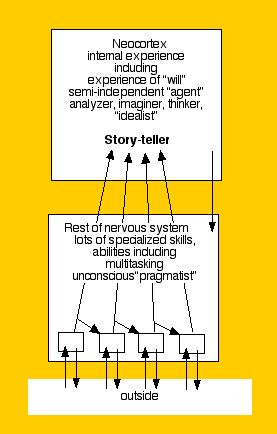 |
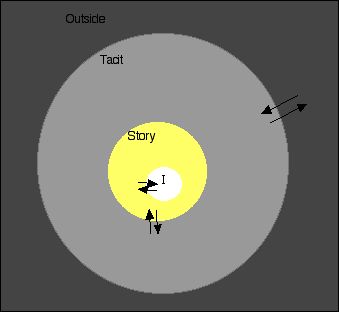
| 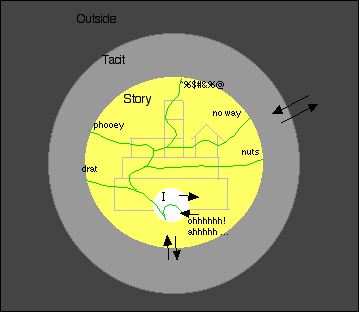 |
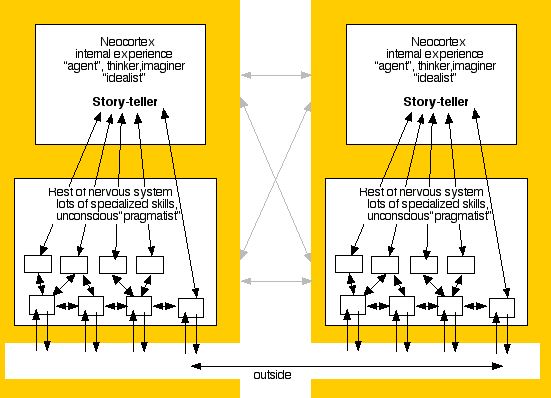 | |
Thanks for your contributions to our collective story telling, including my own. Your thoughts about where we started, have gotten to, might go in the future in the forum ...
To be continued
| Forum | Brain and
Behavior | Serendip Home |